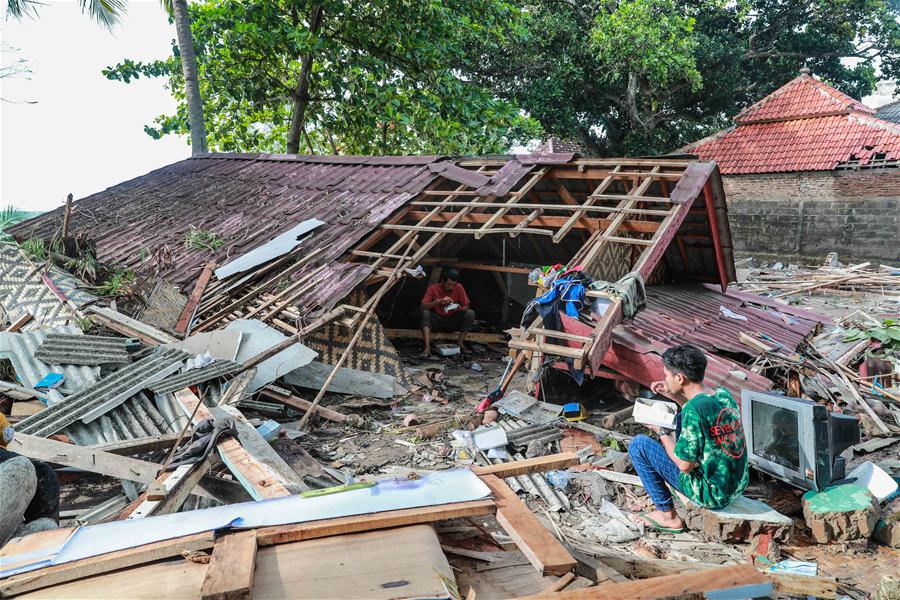


Locals have food at a damaged house in Banten Province, in Indonesia, Dec. 24, 2018. The Indonesian disaster agency on Monday put the death toll of the tsunami triggered by a volcanic eruption at 373 with 1,459 others injured, a spokesman of the agency told Xinhua on Monday. (Xinhua/Zhang Keren)
PANDEGLANG/SERANG, Indonesia, Dec. 24 (Xinhua) -- The death toll of a deadly tsunami hitting Sunda Strait in western Indonesia has risen to 373, with 1,459 others injured, while rescue efforts have continued amid challenges from bad weather and damaged access.
Hundreds of military personnel, police, rescuers and volunteers were conducting search and rescue in the affected areas along the coastlines of western Java and southern Sumatra islands, which were struck on Saturday night by the deadly tsunami following an underwater landslide from Anak Krakatau volcano that has been erupting for months.
Rescuers with heavy machinery equipment have made their access to more affected areas, retrieving more victims of the catastrophe.
"With hard works and supported by heavy machinery equipment, the rescuers have been able to arrive in some devastated areas which were previously difficult to reach," spokesman of the National Disaster Management Agency Sutopo Purwo Nugroho told Xinhua.
The search and rescue operation for victims of the tsunami was underway in the worst-hit Pandeglang and Serang districts in Banten province, and Lampung Selatan, Panawaran and Tenggamus districts in Lampung province.
Indonesian authorities have managed to identify 185 bodies from overall tsunami dead counts in Banten province as of Monday.
Those bodies were identified from 222 recovered in several affected areas in the province as of 16:00 p.m. Monday.
The bodies were recovered by search teams from Banten's affected areas in Tanjung Lesung, Sumur, Panimbang, Labuan, Carita, Cinangka and Sangiang Island.
Unidentified bodies have been transferred to hospitals in Serang, the provincial captial of Banten, and in Pandeglang regency for further identification process.
Indonesian police headquarters spokesperson Pudjo Sulistyo said lack of identification card, finger print damage and supporting data, such as particular signature marks in the bodies were part of challenges faced by the Disaster Victim Identification (DVI) personnel in carrying out their jobs to quickly identify those victims.
Also on Monday, President Joko Widodo visited the affected area by helicopter and praised local authorities for swift action in responding to the latest disaster.
He told journalists that he has ordered the Social Ministry to give compensation to the families of the dead as quickly as possible.
He praised the army and police, along with local government officials, for their work in evacuating shorefront areas, which are still considered a danger zone.
National disaster agency spokesman Sutopo acknowledged on Twitter that the country's network of detection buoys had been dysfunctional since 2012, due to vandalism and budget shortfalls.
"The absence and failure of early tsunami warning systems have contributed to the huge casualties, because people have no opportunity to be evacuated," he said.
The impact of the catastrophe was also amplified at the tourist destination when the tsunami struck Saturday night during a peak time of holiday.
High waves of 4-5 meters slammed into the shore, Endang Permana, head of emergency department of the disaster management agency in the district, told Xinhua.
Saturday night's tsunami in Banten crushed the popular beaches in western tip of Java island that happened to be flocked by holidaymakers who spent togetherness with their loved ones in many hotels and resorts alongside the beach.
The tsunami has displaced 5,665 people, who were taking shelter in evacuation centers, spokesman Sutopo said, adding that the figure dropped from 11,453 as many of the evacuees had returned home.
The tsunami also devastated a total of 681 houses, 69 hotels and villas, as well as 420 ships and boats, he said.
The meteorology and geophysics agency has banned activities in the coastal areas after the deadly tsunami, as the assessment of volcanic eruption risk was being taken.
On Dec. 26, 2004, a massive tsunami triggered by a powerful quake hit countries along the Indian Ocean, killing 226,000 people, including 170,000 in Aceh province of northern tip of Indonesia's Sumatra island.
Anak Krakatau, or Child of Krakatoa, is one of the 129 active volcanoes in Indonesia, a vast archipelagic nation home to 17,500 islands, sitting on a quake-prone zone of so-called "the Pacific Ring of Fire."
Anak Krakatau is the remnant of Krakatau volcano that collapsed into small volcanic islands after its ferocious eruption in August 1883, which also prompted a devastating tsunami that killed more than 36,000 people in Banten.

 Award-winning photos show poverty reduction achievements in NE China's Jilin province
Award-winning photos show poverty reduction achievements in NE China's Jilin province People dance to greet advent of New Year in Ameiqituo Town, Guizhou
People dance to greet advent of New Year in Ameiqituo Town, Guizhou Fire brigade in Shanghai holds group wedding
Fire brigade in Shanghai holds group wedding Tourists enjoy ice sculptures in Datan Town, north China
Tourists enjoy ice sculptures in Datan Town, north China Sunset scenery of Dayan Pagoda in Xi'an
Sunset scenery of Dayan Pagoda in Xi'an Tourists have fun at scenic spot in Nanlong Town, NW China
Tourists have fun at scenic spot in Nanlong Town, NW China Harbin attracts tourists by making best use of ice in winter
Harbin attracts tourists by making best use of ice in winter In pics: FIS Alpine Ski Women's World Cup Slalom
In pics: FIS Alpine Ski Women's World Cup Slalom Black-necked cranes rest at reservoir in Lhunzhub County, Lhasa
Black-necked cranes rest at reservoir in Lhunzhub County, Lhasa China's FAST telescope will be available to foreign scientists in April
China's FAST telescope will be available to foreign scientists in April